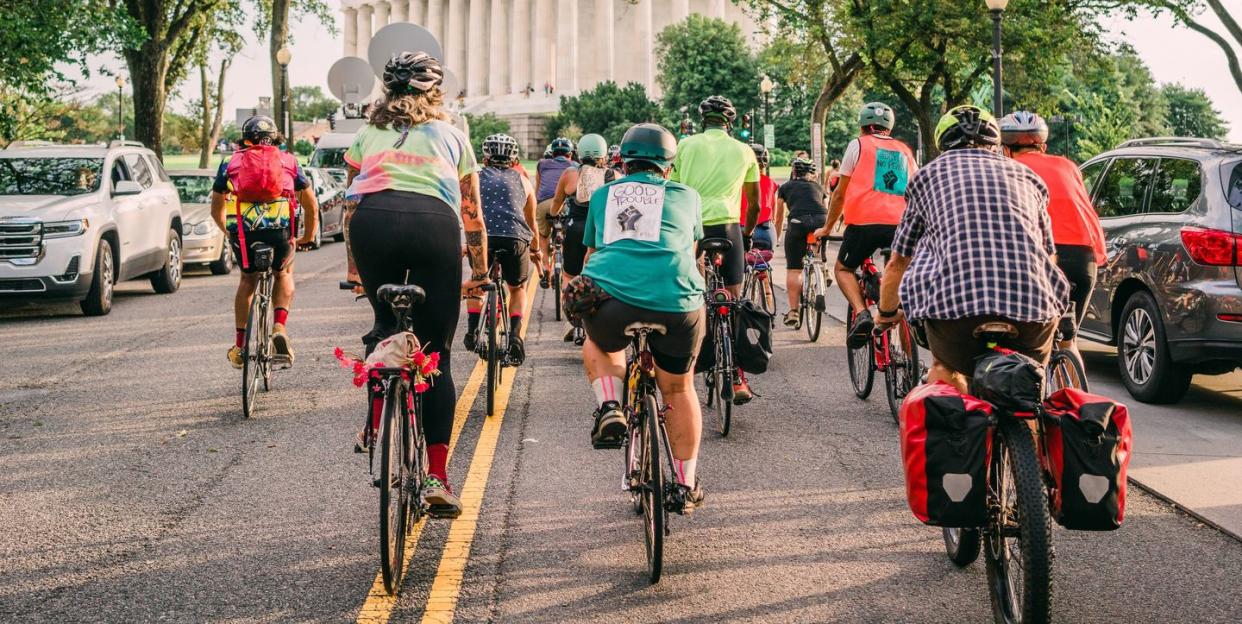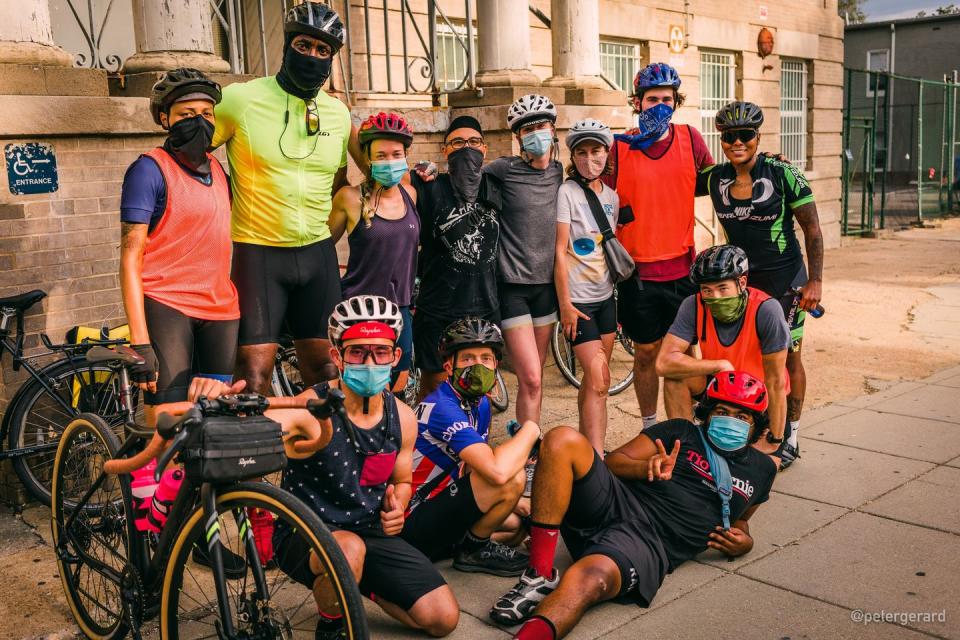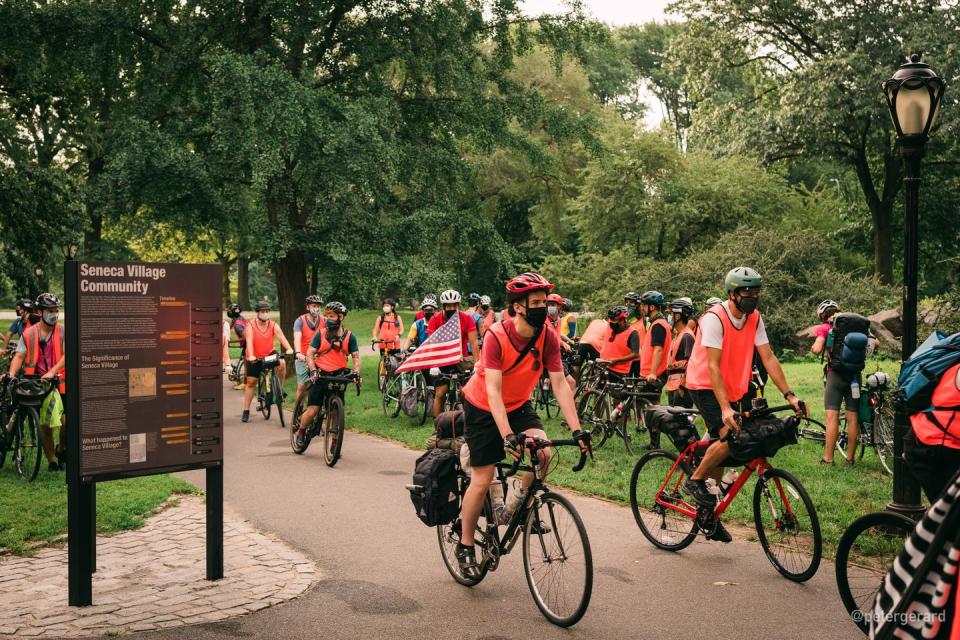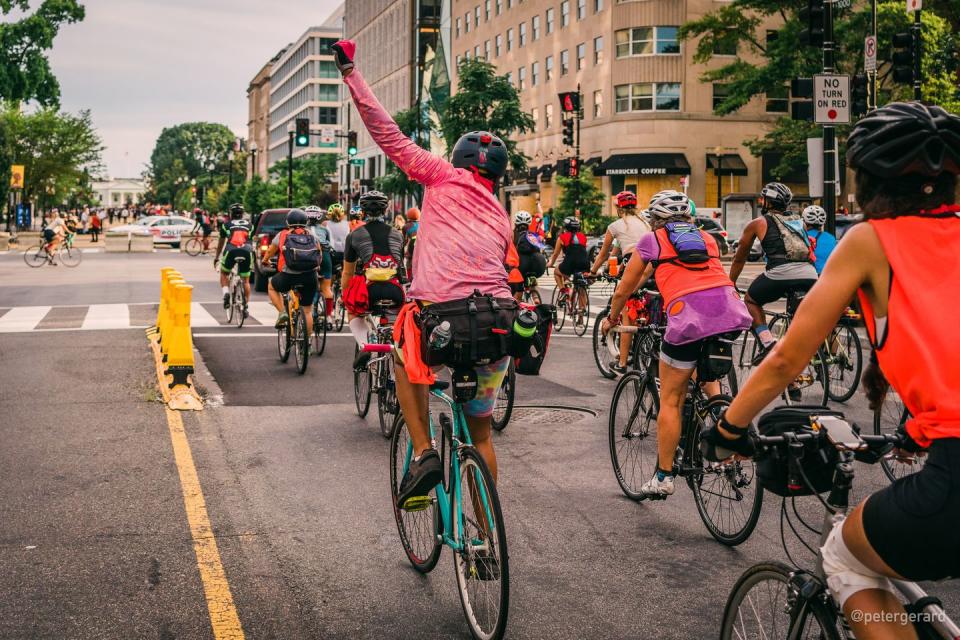These Cyclists Rode 300 Miles to Protest Racial Injustice in D.C.

Lena Tibebe has never really enjoyed attention.
The Ethiopian-born, largely Michigan-raised New York City public school teacher has been active and involved in social justice movements throughout her life. She helped recruit students to her campus’s Black Live Matter group during undergrad at Michigan State University, she has been an advocate for supporting students’ mental and physical wellness within her job as an NYC public school teacher, and she has been active in supporting causes in which she believes.
But after witnessing a number of highly publicized deaths of Black people at the hands of police officers, Tibebe realized that remaining in the background for this specific movement was no longer an option. So, she logged onto Instagram and began organizing the Ride to D.C. to coincide with this year’s March on Washington, a nationwide effort to protest police brutality and racial injustice, held on August 28, 2020.
“I’m a teacher and I have my summer off, so I thought, Why not ride to D.C.?,” Tibebe told Bicycling.
Tibebe hasn’t always been an avid biker, but when COVID-19 disrupted the nation in March, she began to use her bike more often for exercise, to ride around town safely, and to deliver meals to those in need. As racial justice protests sparked across a weary nation, however, Tibebe noticed a change.
“There’s been a shift in the use of a bike,” Tibebe said. “It used to just be used for a commute or as a recreational activity, but the bike has become political. ... I noticed the importance that bikes have within this movement. There are very few marches—at least in New York City—that I’ve attended that did not have bikes. It’s become this political statement and this way to protect protesters.”
Initially, Tibebe had planned to just gather a few friends to ride together as a group from NYC to Washington, D.C. But when she decided to post about her ride on Instagram, what started as a small group of friends blossomed into about 130 people from the NYC area committed to riding to the nation’s capital. Remaining true to her values of inclusion, Tibebe and her team encouraged riders of all experience levels to join, from seasoned cyclists to those who had just purchased their first bike. Tibebe believes that the messaging and meaning behind the ride is what truly attracted individuals that she’d never met to sign up for this journey.
“We want to raise awareness to the fact that there are racial disparities within the Black and Brown community, and that police brutality still exists within the Black community. There was a young man that recently died that was killed by the police while on a bike. This is who and what we want to fight for, awareness and true change.”
The messaging captivated people like Shani Rosemary, a self-described “casual commuter” and project manager for a technology team. Shani heard about the ride from her roommate and decided to participate.
“What caught me really was the tagline that I read for Ride to D.C. which was: ‘Riding to recognize the existence and the significance of black lives,’” Rosemary told Bicycling. “I wanted to give my whole entire body—my spirit, my mental capacity, my emotions—to the fight for Black lives.”

To prepare for the more than 300-mile journey—one of the longest protest rides in America this summer—Tibebe, Rosemary, and the rest of the group participated in three training rides a week in NYC over a period of two months. As the group grew, Tibebe broke teams into “pods,” or groups of about ten riders each so participants could socially distance and ride at the appropriate speed for their individual levels.
Before joining the ride, all participants had to take a COVID-19 test that came back negative, and masks were required when riders were not on the bike and when they couldn’t safely distance from one another when in motion.
For Tibebe, safety, inclusivity, and accessibility were also essential to the cause.
“We want every single person to have access to bikes as well as access to suitable infrastructure,” Tibebe said. “By that, we mean safe bike lanes and parking spaces and whatnot for bikes. We want to change the bike culture that exists in America, we want to have a community where you cannot identify the majority.”
Seeking to make cycling a more inclusive community, the group of riders included a diverse team of people who varied in race, class, gender, and sexual orientation.
Jetting off from Seneca Village, a once thriving African American community pushed out by the white development of Central Park, the Ride to D.C. crew made an explicit effort to highlight many aspects of Black history and identity along the route, including the pieces that aren’t as commonly known.
“It’s very much important that people know that there is a side of history where Black and Brown communities are thriving, and that it is a possibility.”

The crew biked through major cities and rural towns, sometimes encountering people who heckled at their shirts, which bore messages about Black lives and ending police brutality. Still, they remained steadfast in their mission. To help set the tone for each day of riding, the group set intentions for each day, such as recognizing privilege or noticing resilience.
The group decided to visit an underserved neighborhood in Baltimore, Maryland, on their route, which was one of the most impactful stops on the journey for many of the riders, including Erin Poland, a creative art therapist who helped with the ride as the events and outreach lead.
“Seeing the kids coming out of their houses and their faces lighting up where people are telling them that they're important, and that they deserve to have a voice ... I don’t feel like there are words to describe that experience,” Poland told Bicycling of their stop in the Baltimore neighborhood. “It was giving a real face to people and to these protests and this movement right now.”

Tibebe believes cycling with these intentions made the ride all the more powerful and allowed her to recognize the challenges—as well as possibilities—of her life as an Ethipioan woman living in the United States.
“As a Black woman, I have to be resilient,” Tibebe said. “Every day, there is a mountain that I have to climb. And I might reach the top of the mountain and I might go back down, but then there’s always another obstacle I have to battle.”
The riders completed the journey in triumph, reaching the capital six days after departing from NYC, 57 years after Martin Luther King, Jr. led his own momentous march there.
Tibebe plans to do the ride every year. Those who watched the ride through social media have already become more curious as to how to help the group, and Tibebe believes that the cycling community can contribute to the mission well beyond this summer’s ride.
Citing the need to continue fighting for Black lives and to provide bikes for underserved communities, Tibebe wants everyone—including her students—to have access to a bike.
“We want to make sure that everyone has the same access. That is our way of fighting for social justice,” she said.
It’s clear that for all of the riders, the fight is just getting started.
Subscribe to Bicycling All Access for more inspiring stories like this one!
You Might Also Like

